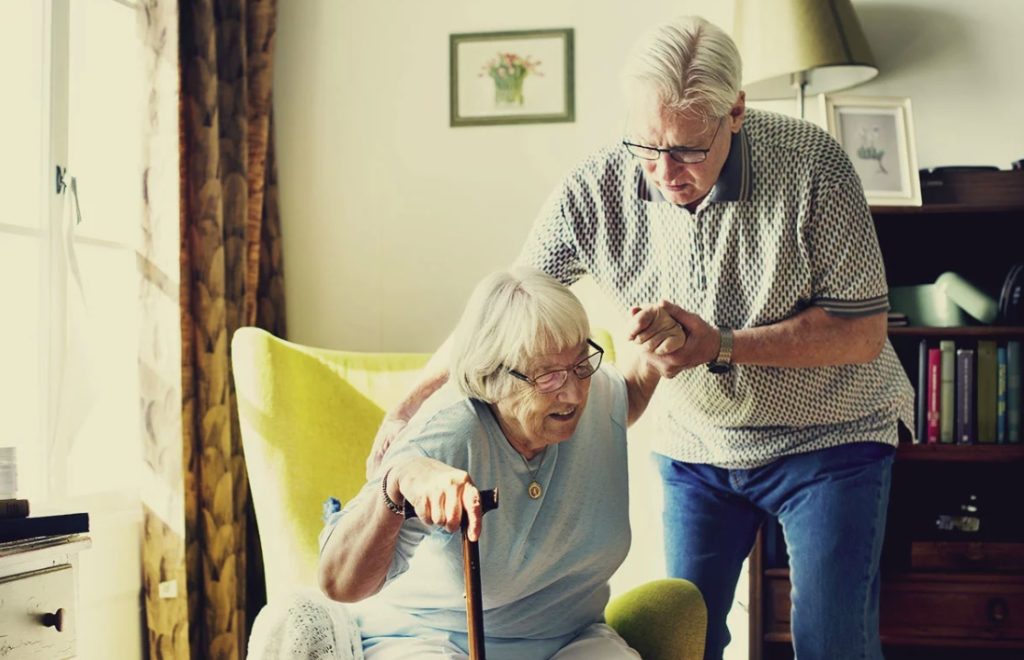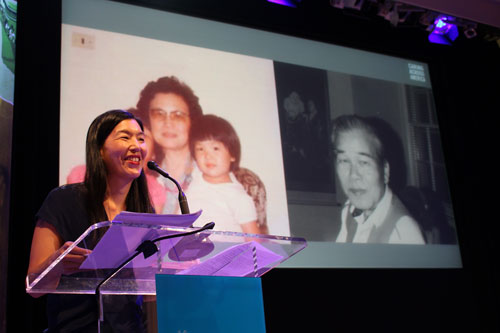by Holly Lawrence. This article originally appeared on Next Avenue.

Two of America’s most influential advocates for caregivers, Maria Shriver and Ai-jen Poo, recently partnered on a poll that examines the state of caregiving in our country. One of the poll’s most significant findings, according to Shriver and Poo: We are a nation of caregivers in crisis, unified across political party lines in support of solutions, and that could influence the election.
The poll underscores the significance of the 2020 election year for Americans who need care or provide care to others.
Ai-jen Poo has made advocating for caregivers (who she describes as “the unsung heroines of so many households”) her lifelong work. Poo is co-founder of Caring Across Generations (CAG) and executive director of the National Domestic Workers Alliance. She was a Next Avenue Influencer in Aging in 2015. Maria Shriver has advocated for the millions of women who either have Alzheimer’s disease or those who are caring for someone with the disease. Shriver is founder of the Women’s Alzheimer’s Movement (WAM), a special contributing correspondent and anchor at NBC News, an author and former First Lady of California.
Caregiving Poll Results
The poll, an online survey, was conducted from Oct. 21 to Oct. 26, 2019, by Hart Research Associates on behalf of WAM and CAG. It included 1,510 adults nationwide with oversamples to be sure to get at least 200 interviews each with African American and Latino people. Some of the key findings:
- 37% of respondents identified as either leaning Republican or strong Republican; 43% identified as either leaning Democrat or strong Democrat and 20% identified as an Independent
- 66% provide, or previously provided, care for an older relative, stay-at-home care for a preschool child, daily care for a disabled family member or daily care for a family member with Alzheimer’s or dementia
- The caregivers estimated they spend (or spent) an average of roughly 36 hours a week providing care. For many, this is in addition to their job (55% are employed full-time; 69% are employed part-time).
- 56% do not believe that there are enough caregiving professionals to take care of those in need now and in the future
- Across political party lines, 85% of respondents are much more likely to support a candidate who prioritizes improving quality of care for people as they get older, and support for their caregivers
- 82% support a proposal for a federal program that everyone pays into, and could access as needed, for caregiving needs
- Due to caregiving responsibilities, a significant number have not voted in an election (20%), are not feeling informed enough about candidates and issues to vote in elections (33%) and are having a hard time keeping up with the news and current events (36%)
I interviewed Shriver and Poo separately by email; these interviews have been edited and condensed for length and clarity.
Shriver explained that the 2019 poll was her organization’s first partnership with CAG. She worked with Poo on caregiving issues for the 2010 Shriver Report.
“Many years later, with baby boomers aging in record numbers, we wanted to check back in on how America is coping with the caregiving issue, and WAM chose to partner with CAG given its leadership in the field, and its understanding of many creative, hopefully viable, policy solutions,” Shriver said.

Ai-jen Poo speaks at the Age of Dignity Book Event at the Ford Foundation Center for Social Justice Jan. 22, 2015 (photo courtesy of Caring Across Generations)
The need for care is growing exponentially, as people are living longer than predicted, explained Poo.
“While longevity is positive, we have yet to update or reimagine our systems and supports for today’s families,” she said. “The pressure and cost of providing care to our loved ones is being borne silently by family caregivers who are struggling to balance caregiving responsibilities with their jobs and other responsibilities.”
Poo saw the need to conduct a poll now to “shine a light on this cost of caregiving, to better understand how families are grappling with the increased need for care, and to learn what solutions they want to see from elected officials as we move into this critical 2020 election year.”
Q&A with Shriver and Poo
Holly Lawrence: Which poll result confirmed your thinking, surprised you or caused you most concern?
Shriver: I’m concerned by some of the poll results for a number of reasons, since they show potential for long-term care needs and costs that could bankrupt America’s families — women in particular. As a country, we remain largely unaware that Alzheimer’s — an extremely expensive disease in terms of the cost of care — is diagnosed in twice as many women as men.
Despite the fact that long-term care will cost the average American over sixty-five roughly $138,000 a year, only thirty-four percent of us have even started to put aside some long-term care savings. That’s troubling — and putting us on the fast track to a crisis as baby boomers age. I am also tremendously concerned about how this impending financial crisis is going to squeeze younger people as they struggle to set aside money for their own children and futures, just to suddenly find themselves responsible for aging parents as well.
Poo: The poll confirmed that Americans are united by our shared need and support for solutions for caregivers to ensure our loved ones have access to the care they need. In addition to the strong bipartisan support for a federal program, support is consistently high across race, with seventy-eight percent of white respondents, eighty-six percent of Latino respondents, and ninety-one percent of African American respondents saying that they would support such a program.
How do you propose that the 2020 presidential candidates address the caregiving issues that were revealed in your poll?
Shriver: I would hope the candidates would take heart and listen to what we learned in this poll. A resounding eighty-five percent of Americans from both sides of the political aisle and bridging racial and age divides said they would be more likely to support a candidate who prioritizes quality care for all Americans, including older ones. It looks like we finally have an issue that can unite us all, and I hope it’s a message we’ll hear addressed at the next presidential debate.”
Poo: Presidential candidates need to listen to caregivers, who are an overwhelming majority of our electorate. We’re living in a country where families are desperate for solutions to make it easier to care for the people they love, and this poll affirms what caregiving families across America already know — that comprehensive solutions are needed, and they’re needed now. This is an opportunity for candidates to show up for families.
What do you feel are the most serious challenges for caregivers, and what should concern Americans the most?
Poo: All of the challenges that caregivers are experiencing are serious. No one should have to work a full-time job on top of a full-time caregiving job because they don’t have the support they need to care for their loved ones.
But we need to be very concerned that our outdated care infrastructure is actually preventing people from fully participating in our democracy. It’s precisely these caregiving responsibilities that could prevent civic engagement. This hits key parts of the rising American electorate particularly hard: twenty-eight percent of Latino respondents report not having cast a ballot in a past election because of caregiving, and thirty percent of millennials reported the same. We risk reinforcing and exacerbating existing inequities and pressures if we don’t begin supporting caregivers in a fundamentally new way.

Maria Shriver speaks at the Purple Evening event hosted Oct. 10, 2019, by The Kensington Redondo Beach assisted living community in Redondo Beach, Calif. (photo credit: Jerry Camarillo)
Shriver: Caregiving seems to be our common destiny. We are an aging society, so I think it’s important we understand that our nation’s caregiving needs are a shared reality. The issues around them affect us all, not just some. Not just women or men. Not just old or young. Not just rich or poor, able-bodied or those with special needs. And as our poll indicates, neither largely conservative or liberal. It turns out, we are all pretty much struggling with the problems of caregiving or the threat they are looming. Each of us was cared for when we were young, and most of us will need at least some care in the future as we age.
I would like to change the language around this issue to reflect the unity our poll indicates Americans feel. I hope our leaders recognize the power of an issue that not only embraces our common humanity, but may also provide a path to common ground.
The opinions expressed in this article are those of the author and do not necessarily reflect those of the Diverse Elders Coalition.

